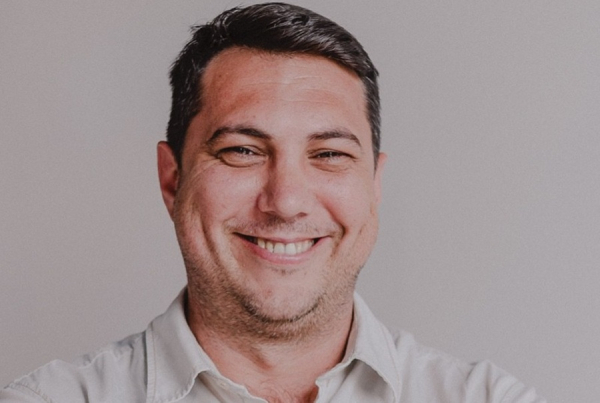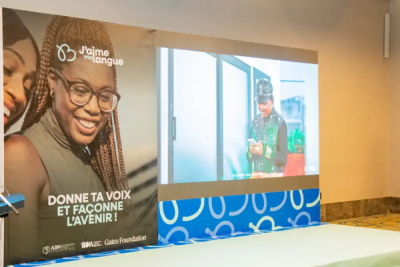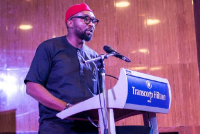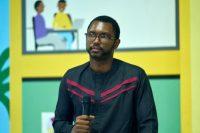-
Badger Analytics, founded in March 2025, uses satellite and drone imagery to create color-coded crop health maps.
-
The platform helps farmers identify high- and low-performance areas to guide precise interventions.
-
Khanya Nyawo also heads Premier Agric, a consultancy promoting productivity and sustainable farming practices.
South African tech entrepreneur Khanya Nyawo is leveraging visual data analytics to make crop management simpler and more efficient. As the founder of Badger Analytics, he has developed a digital platform that helps farmers monitor and understand crop health through imagery-based data.
Founded in March 2025, Badger Analytics automatically collects data from satellite and drone images. The system cleans and processes this data to generate color-coded crop health maps, enabling farmers to quickly spot areas performing well and those needing intervention.
The results are displayed on an interactive dashboard designed for on-field use. Farmers can view the condition of their plots at a glance and convert complex datasets into practical, daily insights—without requiring technical expertise.
The platform targets commercial and smallholder farms that want to track crop health across seasons and optimize interventions based on measurable indicators. It caters to both producers seeking a comprehensive overview and managers aiming for data-driven decision-making.
Alongside Badger Analytics, Nyawo serves as managing director of Premier Agric, an agribusiness consultancy offering support in crop management, product development, training, and agricultural insurance. The firm focuses on boosting productivity, reducing costs, and promoting sustainable practices across Africa’s farming ecosystem.
Before this, Nyawo led Khathom Agriculture between 2016 and 2020, a company dedicated to agricultural advisory services and farmer empowerment in Southern Africa.
A graduate of Cedara College of Agriculture in South Africa (class of 2013), Nyawo has built his career around integrating technology and agronomy to empower African farmers through innovation and accessibility.
This article was initially published in French by Melchior Koba
Adapted in English by Ange Jason Quenum
-
AgriLogiq, founded in 2020, develops predictive automation systems for greenhouse and tunnel farming.
-
The company integrates climate, irrigation, and fertilization controls driven by real-time data analytics.
-
Joel van der Schyff combines engineering and technology to enhance resource efficiency and crop yields.
South African entrepreneur Joel van der Schyff is transforming how producers manage greenhouse crops by placing data at the core of agricultural operations. As co-founder, CEO, and head of growth at AgriLogiq, he merges engineering expertise with technological innovation to optimize controlled-environment farming.
Founded in 2020, AgriLogiq designs predictive automation systems for greenhouses and tunnels. These systems help farmers boost yields while optimizing water, energy, and input use.
AgriLogiq’s integrated solutions combine climate, irrigation, and fertilization controls, all powered by data analysis to adjust growing conditions in real time. The company connects farmers to their operations via a comprehensive digital platform that links sensors, hardware, and automation software.
By collecting, processing, and interpreting data, AgriLogiq enables growers to improve precision and efficiency in every stage of protected cultivation.
Before founding AgriLogiq, van der Schyff co-founded Machman in 2011, a firm that provided manufacturing improvement solutions for the agro-processing sector. He served as sales and finance director until 2017.
He later joined LLB Innovative Foods in 2019 as operations director, and became project and third-party distribution manager in 2020. Between 2021 and 2024, he was also a shareholder at TS Tec, a provider of IT security and support services.
Van der Schyff earned a mechanical and electrical engineering diploma from Northlink College in 2011 and an MBA in operations management from the University of Cape Town Graduate School of Business in 2018.
Through AgriLogiq, he aims to make data-driven agriculture accessible to a wider range of producers in Africa, helping them balance productivity, sustainability, and profitability in a changing climate.
This article was initially published in French by Melchior Koba
Adapted in English by Ange Jason Quenum
-
Juicyway enables users to send, receive, and hold multiple foreign currencies on one platform.
-
The fintech claims over $1 billion in transaction volume and more than 12,000 business clients.
-
It integrates fiat and stablecoin infrastructure to simplify cross-border payments.
Juicyway, a Nigeria-based fintech startup, aims to establish itself as a leading payment platform by enabling individuals and businesses to send, receive, and store foreign currencies through a single interface.
Founded in 2021 by Ife Johnson, Justin Ziegler, and Idris Ibrahim, Juicyway addresses common constraints across African markets, including limited access to U.S. dollar liquidity, unfavorable exchange rates, and lengthy international payment delays.
The platform offers a mobile app available on iOS and Android, which has already surpassed 10,000 downloads, according to Play Store data.
Juicyway allows users to open multi-currency accounts—including the naira, U.S. dollar, Canadian dollar, British pound, and euro—as well as cryptocurrency wallets. Customers can receive international payments directly into their own U.S. or Canadian dollar accounts, simplifying invoicing for overseas transactions.
The app also supports sending funds and converting currencies at competitive rates within the same ecosystem.
“We identified a clear gap for a B2B-focused payment and exchange platform capable of offering U.S. dollar accounts in company names for international receivables, providing competitive FX conversions through regulated liquidity providers, and enabling instant settlements via stablecoins and fiat rails,” said Ife Johnson in an interview with Disrupt Africa.
Juicyway differentiates itself through the integration of payment, foreign exchange, and stablecoin infrastructures, designed to streamline international settlements.
The company claims to have processed over $1 billion in transaction volume and serves a growing client base exceeding 12,000 enterprises.
With its unified approach to currency management and international transactions, Juicyway positions itself as a single gateway for cross-border payments, foreign currency reception, and multi-currency account management.
The startup’s expansion underscores Africa’s accelerating shift toward digital finance solutions and its increasing reliance on fintech innovation to overcome currency and liquidity challenges.
This article was initially published in French by Adoni Conrad Quenum
Adapted in English by Ange Jason Quenum
-
Founder and CEO of HyperTech Niger, a digital solutions and electronics firm
-
Company develops tools such as Success System and Hypertrack for businesses
-
Aims to support Niger’s digital transformation and local tech ecosystem
Mahamadou Abdoul Hairou Djibo is a Nigerien entrepreneur and the founder and director of HyperTech Niger, a company specializing in the sale of electronic devices and the delivery of digital solutions.
Founded in 2023, HyperTech Niger positions itself as a technology partner supporting the country’s digital development. The company offers modern electronic products and digital services tailored to the needs of both individuals and businesses.
Among its flagship products is Success System, a web application that streamlines commercial operations. It provides an interface for managing transaction vouchers and helps improve the processing of business exchanges.
HyperTech Niger has also developed Hypertrack, a geolocation solution designed for Niger’s local context. Aimed at both companies and individuals, the platform enables real-time tracking and management of equipment or vehicles. It is compatible with various devices—including phones, motorcycles, tricycles, cars, and trucks—and centralizes monitoring through an intuitive interface.
Mahamadou Abdoul Hairou Djibo holds a professional bachelor’s degree in electronics, electrotechnics, and automation from the Private University of Sousse in Tunisia. From 2022 to 2024, he served as director of Saratech Niger, an organization dedicated to promoting practical STEM (science, technology, engineering, and mathematics) education among children, students, and young professionals.
-
Initiative aims to integrate Beninese languages into artificial intelligence
-
Citizens can record voice samples to train AI models on local languages
-
Project supports Benin’s national AI and big data strategy adopted in 2023
The Beninese government officially launched the “JaimeMaLangue” project on November 10 in Cotonou, an innovative initiative designed to integrate local languages into the artificial intelligence ecosystem. Led by the Agency for Information Systems and Digital Technology (ASIN) in partnership with the IIDiA Institute, the project combines culture and technology to promote linguistic inclusion.
Launched under the theme “Benin Speaks to the Future,” the initiative marks the beginning of a nationwide voice collection campaign. Citizens are invited to participate via the platform jaimemalangue.bj, where they can record sentences in their mother tongue. These recordings, validated by a committee of experts, will form a national database to train AI models capable of understanding and reproducing local languages. The pilot phase begins with Fongbé and will later expand to other languages such as Yoruba and Baatonu.
This national initiative is part of the National Artificial Intelligence and Big Data Strategy adopted in January 2023. Its goal is to leverage AI’s potential in sectors such as education, health, agriculture, and tourism, while positioning Benin as a key AI player in West Africa.
Beyond technological innovation, “JaimeMaLangue” reflects Benin’s ambition to be among the African pioneers in promoting an inclusive and culturally grounded digital environment. The project follows several recent initiatives, including the launch of the Beninese Languages Dictionary in July, illustrating the convergence between cultural identity and digital transformation.
By developing AI capable of understanding local languages, Benin aims not only to strengthen citizen participation but also to make digital services more accessible to all, regardless of the language spoken.
- Cookeza, a Togolese foodtech startup founded in 2024, sells ready-to-cook meal kits made from 100% local ingredients.
- The platform partners directly with local farmers to ensure freshness and support the national agri-food value chain.
- The company plans to expand across West Africa and diversify distribution through subscriptions and supermarkets.
Cookeza, a Lomé-based startup, aims to redefine convenience cooking in Togo by offering online ready-to-cook food kits featuring locally sourced ingredients. The company targets busy urban consumers who want quick meals without losing touch with traditional African flavors.
Founded in 2024 by Duphanie Amadou, Cookeza operates an e-commerce platform that sells boxes containing washed, chopped, and seasoned ingredients for authentic African dishes. Customers receive recipe cards and can order delivery to their homes or pick-up points.
“Cookeza was born from a simple observation: modern African families lack time to cook but don’t want to sacrifice quality or forget their culinary roots,” the company states on its website. “We work directly with local producers to ensure freshness and quality while supporting the local economy.”
The platform integrates e-commerce and urban logistics to shorten cooking time. Through its website, users can browse meal kits—such as traditional Togolese recipes—and order online. Each pack includes all necessary ingredients sourced from nearby farmers, ensuring both freshness and traceability.
Cookeza’s model benefits not only consumers but also Togo’s agricultural value chain. By prioritizing local sourcing, the company strengthens ties between food producers and urban markets, offering farmers a steady outlet for their produce.
Although Cookeza has not yet launched a mobile app, customers can order directly via web browsers. The company also offers subscription packages for restaurants, corporate canteens, and households, including a monthly plan priced at CFA40,000 (about $70.70).
With around 20 available recipes, Cookeza plans to expand its offerings and distribution channels. Future goals include partnerships with supermarkets and regional expansion into West Africa.
The startup faces challenges typical of the sector: maintaining quality at scale, optimizing delivery logistics, and competing with fast-food chains and ready-made meal providers. However, its focus on authentic African cuisine and local supply chains could help it secure a strong niche in the growing African foodtech market.
This article was initially published in French by Adoni Conrad Quenum
Adapted in English by Ange Jason Quenum
-
LooseChange, founded in 2019 by Michael Okoye, enables small businesses to accept digital payments directly from smartphones without extra hardware.
-
The platform centralizes billing, customer data, and accounting to simplify daily financial management.
-
Okoye aims to make LooseChange a one-stop digital tool for SMEs to track sales, manage receivables, and generate financial reports.
Nigerian entrepreneur Michael Okoye is reshaping how small and medium-sized enterprises (SMEs) record and collect payments through LooseChange, a fintech startup that turns smartphones into payment terminals.
Okoye, who serves as founder and CEO, launched the company in 2019 to help business owners manage transactions, invoices, and customer data from a single interface.
LooseChange’s technology allows merchants to accept digital payments, issue invoices, and maintain simplified accounting records using only a smartphone—eliminating the need for traditional point-of-sale terminals.
The solution consolidates financial operations and automates processes such as invoice generation, receipts, and transaction tracking. By doing so, the platform reduces equipment costs, enhances payment traceability, and improves cash flow management for small businesses.
LooseChange’s system integrates sales tracking, receivable management, and financial reporting across all payment methods. The platform positions itself as a digital one-stop shop for business operations, helping SMEs move toward financial transparency and efficiency.
Okoye’s approach reflects a broader trend in Africa’s fintech ecosystem, where startups increasingly focus on low-cost, mobile-first payment solutions to serve the continent’s vast informal and small-business sectors.
Beyond fintech, Michael Okoye sits on the board of the Nur Outreach Programme for Drugs Education & Reintegration, a Nigerian nonprofit focused on drug prevention and mental health care.
A graduate of Caritas University with a bachelor’s degree in electrical and electronic engineering, Okoye began his career in 2012 as executive development manager at Pyrich Group, a software and IT consulting firm.
In 2015, he joined Topaz ICT Solutions as business development manager, a position he held until 2019. He also served as programs head at the National Youth Council of Nigeria in 2018, reflecting his growing involvement in youth and technology initiatives.
This article was initially published in French by Melchior Koba
Adapted in English by Ange Jason Quenum
-
Founded in 2023, Juboo automates financial reconciliation across banks, mobile money, and accounting systems.
-
The AI-powered platform uses OCR and machine learning to detect and match transactions from multiple data sources.
-
Co-founder Tanoor Dieng also leads Baamtu Technologies, a Senegalese firm specializing in AI and enterprise software.
Senegalese entrepreneur Tanoor Dieng is addressing a critical yet often overlooked aspect of business finance—data reconciliation. His company Juboo provides an automated platform that enhances transparency in financial operations and strengthens corporate financial management.
Dieng, a trained computer scientist, co-founded Juboo in 2023 and serves as its Chief Executive Officer. The platform enables companies to maintain control over their financial flows by automatically reconciling data from multiple sources, including banks, mobile money operators, and accounting ledgers.
Juboo uses artificial intelligence to extract and compare transaction data from PDF files, bank statement images, and accounting logs. Through optical character recognition (OCR) and computer vision, the platform processes and matches records without manual input.
The system’s machine learning algorithms can identify discrepancies and associate corresponding transactions even when identifiers differ across systems, ensuring consistency and reliability in financial reporting.
Juboo integrates with various financial partners and adapts to each company’s technological setup. Its core users include finance, accounting, and operations departments that handle multichannel transaction flows and require accurate reconciliations between internal systems, banks, and payment providers.
By automating these tasks, the platform reduces human error, saves time, and provides real-time visibility into financial discrepancies—benefits increasingly valuable to African businesses managing diverse payment ecosystems.
Beyond Juboo, Tanoor Dieng serves as Co-founder and Product Director at Baamtu Technologies, a Senegal-based firm specializing in information systems, data science, and artificial intelligence.
Founded in 2008, Baamtu supports organizations in deploying enterprise resource planning (ERP) software and executing digital transformation initiatives across multiple sectors.
Dieng’s career reflects a consistent commitment to building African technology solutions that improve operational efficiency and promote digital sovereignty.
Dieng earned a master’s degree in computer science from the University of Caen Normandy in 2003 and obtained a postgraduate degree in algorithmics and artificial intelligence in 2004. His expertise in AI has guided his mission to leverage automation for financial and business process optimization in Africa.
This article was initially published in French by Melchior Koba
Adapted in English by Ange Jason Quenum
- Dakar Port, Customs launch digital BAD exchange system for Jan 2026 rollout
- Reform streamlines cargo clearance, links all port IT systems via GUPE
- Expected to cut delays, boost traceability, and secure cargo operations
The Autonomous Port of Dakar (PAD) and the Directorate General of Customs (DGD) have launched a pilot program for the electronic exchange of Goods Release Orders (BADs). The system is scheduled to go live on January 2, 2026, via the Electronic Port Single Window (GUPE).
The initiative seeks to improve transparency and efficiency in the logistics chain by streamlining cargo clearance operations.
The new system will connect the IT platforms of all port stakeholders to enable the automatic, near-instant processing of BADs. Previously, although partially digitized, the Goods Release Order, a key document authorizing cargo exit, still required manual validation and separate technical exchanges, causing delays and increasing the risk of errors.
This system interconnection completes the digitalization process undertaken by the Port of Dakar in recent years. The initiative builds on the PAD/DGD/DPW/GAINDE 2000 electronic data exchange protocol signed on June 3, 2025, which established interoperability between port and customs systems. It also forms part of Senegal’s broader effort to modernize its logistics chain through digital transformation, following the rollout of the Orbus Infinity platform in February 2024.
As a strategic player in foreign trade, PAD generates nearly 95% of national customs revenue, around 25% of the state budget, and plays a central role in Senegal’s economy. Through this interconnection, the port expects to achieve significant reductions in processing times, better traceability of operations, and enhanced security for cargo flows.
The electronic BAD exchange is also expected to reduce administrative burdens for operators and give them greater visibility over port activities.
Samira Njoya
MoloMoloPay is a Cameroonian financial technology app that makes installment payments accessible to more consumers.
The fintech app was developed by a Cameroonian start-up of the same name. It lets users “choose an item and start saving until they can buy it.” Founded in 2023 by Oussoumanou Sehou, the company has offices in Abidjan (Côte d’Ivoire), Douala (Cameroon), and Mauritius.
The service operates through a mobile app available on iOS and Android, which has already recorded over 100,000 downloads, according to Play Store data. After installing the app, users register, choose an item, such as a smartphone, home appliance, or motorcycle, and make payments at their own pace. Once the full amount is saved, they can collect the product.
This model addresses regional realities, notably the widespread use of mobile money services like Orange Money and MTN MoMo, and a young population eager to access durable goods. The app integrates these payment methods and offers more than 5,000 products across over 100 categories through its partner network. Since its launch, MoloMoloPay says it has attracted 250,000 active users and generated more than 10 billion CFA francs (around $17.6 million) in revenue.
MoloMoloPay’s rise comes as digital payment solutions grow across Africa, even as the traditional “Buy Now, Pay Later” credit model remains underdeveloped. By using a savings-based approach instead of credit, the app minimizes users’ financial risk and opens installment payment options to those excluded from formal banking.
For partner merchants, MoloMoloPay creates a new distribution channel, enabling them to reach more customers without requiring upfront payment until the purchase is fully funded.
The company still faces key challenges: ensuring users remain consistent in their savings, streamlining delivery logistics, and building trust in a rapidly evolving digital ecosystem.
Adoni Conrad Quenum
More...
- UNDP-backed project boosts digital skills, enables virtual court operations
- Digitization cuts costs, expands access, supports remote testimony for survivors
Malawi’s judiciary launched a new Information and Communications Technology (ICT) policy and a dedicated ICT laboratory on Monday, November 3, in Blantyre.
The initiative, carried out in partnership with the United Nations Development Programme (UNDP), aims to modernize judicial procedures, improve access to justice, and strengthen the rule of law.
The new policy sets out a framework for digital transformation focused on governance, security, capacity building, and institutional resilience. The accompanying ICT laboratory will serve as an innovation and training center for judges, magistrates, and judicial staff. It aims to strengthen their digital skills and allow them to test technology solutions suited to local needs.
This project builds on ongoing digitization efforts launched in 2024. With UNDP support, the judiciary has already established twenty pilot virtual court sites connecting courts, prisons, and police stations. The system has reduced administrative costs by roughly 375 million Malawian Kwacha (about $216,600) over fifteen months while improving access to justice. Notably, it allows survivors of sexual and gender-based violence to testify remotely.
The new ICT policy is expected to accelerate the digital transformation of Malawi’s judiciary, improving transparency and efficiency and strengthening public confidence in the justice system.
Malawi joins other African nations such as Rwanda, Kenya, and Ghana that are modernizing their justice systems by introducing online platforms, virtual hearings, and paperless procedures to reduce delays and expand access to justice.
Samira Njoya
Seeking to become a major leader in African subsea infrastructure maintenance, Orange has ramped up its efforts. The multinational company confirmed that it has committed substantial new investments to meet this strategic goal.
French telecoms group Orange is expanding its subsea repair operations with the construction of two new cable-laying vessels that will maintain submarine infrastructure across Europe, the Middle East, and Africa, its subsidiary Orange Marine said on Monday.
Orange Marine and Elettra Tlc president Didier Dillard described the investment as strategic, saying the industry’s aging fleet has become a key concern.
“Building these new ships will enable Orange Marine and Elettra to have the most modern fleet in the world, serving all our clients globally, with an optimized environmental footprint,” Dillard said.
In Africa, the ships are expected to accelerate cable repairs and improve the reliability of coastal internet connections, which are often disrupted by storms, fishing activity, or outdated equipment. Almost all of the continent’s internet traffic runs through deep-sea fiber-optic cables that, when damaged, can slow or paralyze entire countries.
That vulnerability was exposed in March 2024, when multiple cables off Abidjan, including WACS, ACE, MainOne, and SAT-3, were damaged, causing widespread outages across West and Central Africa. Service restoration took several weeks for some systems.
Orange said the new ships, combined with a broader and better-distributed maintenance network, will cut repair times and limit revenue losses in its data business.
The vessels, modern versions of the Sophie Germain launched in 2023, have been ordered from Sri Lanka’s Colombo Dockyard and are scheduled to enter service in 2028 and 2029. They will be capable of maintaining existing systems and installing new cables at depths of up to 1,000 meters.
They will replace the Léon Thévenin, launched in 1983 and based in South Africa, and the Antonio Meucci, launched in 1987 and based in Italy. Those two ships currently handle cable maintenance in the Atlantic, Indian Ocean, Mediterranean, Black Sea, and Red Sea.
Each new vessel will feature hybrid diesel-battery propulsion, a streamlined hull that reduces fuel use by 25%, and Azipod thrusters for greater maneuverability. The design is expected to cut CO2 emissions by 20% compared with the current fleet. Shore-power connections will further reduce emissions while docked, and each ship will carry a remotely operated vehicle (ROV) designed by Orange Marine for rapid cable cutting, inspection, and burial.
Applied to African coasts, these improvements should reduce internet downtime affecting banks, governments, payment platforms, and e-health services.
Through Orange Marine and Elettra Tlc, the group currently operates two cable-laying vessels and one hydrographic survey ship.
“As a leader in global digital infrastructure, Orange manages over 450,000 km of undersea cables connecting all continents,” said Michaël Trabbia, CEO of Orange Wholesale. “This strategic investment in our fleet of cable ships will be a key to ensuring the resilience and security of the global Internet.” Orange’s message is clear: resilience is now a requirement, not a luxury.
Muriel EDJO
- Kenya and Denmark sign a cooperation deal on digital governance and public service modernization.
- The partnership will focus on digital infrastructure, interoperability, and capacity building.
- Denmark ranks first globally in e-government, while Kenya aims to expand digital access through its 2022–2032 master plan.
Kenya’s Cabinet Secretary for Information, Communications, and the Digital Economy, William Kabogo Gitau, and Denmark’s Ambassador to Kenya, Stephan Schønemann, signed a memorandum of understanding on November 6 in Nairobi to strengthen bilateral cooperation in the digital sector. The agreement covers public service modernization, knowledge exchange, and citizen-centered digital service development.
“This strategic collaboration will create joint opportunities in areas such as digital public infrastructure, interoperability frameworks, capacity building, policy dialogue, knowledge exchange, and expert forums between our two nations,” William Kabogo said on X.
Kenya has emerged in recent years as one of Africa’s most dynamic digital hubs. Through its Digital Master Plan 2022–2032, the country aims to deploy 1,450 community digital centers and digitize all public services. These initiatives have already improved its e-governance ranking. According to the United Nations’ 2024 E-Government Development Index, Kenya scored 0.6314 out of 1, ranking 109th out of 193 countries.
Denmark, meanwhile, leads the same index with a score of 0.9847, confirming its global leadership in digital governance. Its 2022–2026 national digital strategy focuses on cybersecurity, data interoperability, and improving state-citizen relations through unified, inclusive platforms.
This new agreement follows an initial memorandum of understanding signed in March, focused on cooperation in higher education, research, and innovation. It reflects the growing strategic partnership between Nairobi and Copenhagen around technology development and digital transformation.
The implementation of this new partnership is expected to benefit both countries, which are each pursuing global leadership in digital innovation. For Kenya, it should promote knowledge transfer, strengthen institutional capacity, and enhance public service performance. Denmark, for its part, gains an opportunity to showcase its expertise in digital governance and expand its technological cooperation with Africa through inclusive, sustainable partnerships.
He is working to formalize the relationship between brands and content creators in a social media-driven market. His efforts are part of Tunisia’s broader digital transformation.
Midox Mbarek Mohamed Salah, a Tunisian entrepreneur and digital strategist, is the founder and CEO of TAWA Digital Talents, a startup that connects content creators with brands to boost visibility.
Founded in 2020, TAWA Digital Talents launched the Content Factory platform, which links brands to a network of more than 9,000 creators for tailored content production. The system uses artificial intelligence to optimize campaign management, offering real-time monitoring and payment only for approved content.
The platform lets brands submit creative briefs and approve content in under 24 hours through an automated process. Brands pay only for the content they choose to keep, helping them optimize budgets and reduce risk. Performance is tracked in real time, with content optimized for social media formats such as TikTok and Instagram Reels.
Alongside his entrepreneurial work, Midox Mbarek Mohamed Salah is also a sports journalist for DAZN France. He holds a bachelor’s degree in applied computer science for management, earned in 2011 from the Arab University of Sciences in Tunis. He also completed a business program at the School of Digital Economy at the University of La Manouba between 2020 and 2021.
His professional experience includes working as a digital project manager at the marketing firm Streamerz from 2011. In 2014, he joined Digidox Marketing Consulting as a digital marketing consultant. From 2021 to 2022, he worked as a digital transformation advisor for the Espérance Sportive de Tunis football club.
Melchior Koba















